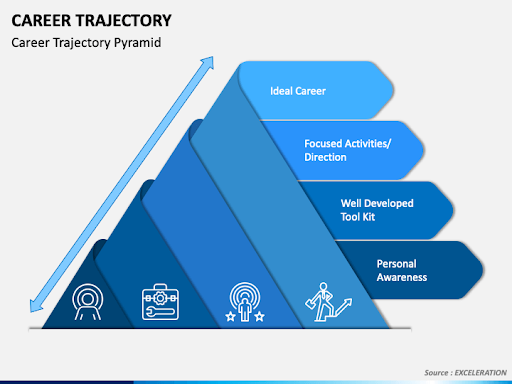The road to success- understanding your career trajectory
![[object Object]](http://images.ctfassets.net/ly25iagmtxce/628O6jxDIuzIr1wqyzu0y5/aac7dbeafd71c5a7e5feb3c751294e3b/alvin-mahmudov-DnJioJ8nhxI-unsplash.jpg)
Photo by Alvin Mahmudov on Unsplash
According to statistics, the average worker changes careers every 4 years. Are you looking to take the next step in your career? Or perhaps pursue a different career path? Understanding your career trajectory can help you make informed decisions about your future.
Some people might want to follow a linear path, where they climb the ranks at one company or in one industry. In contrast, others might be more interested in switching and trying new things. And you know what? No harm in making a change. There's no one "right" way to have a career! It's all about finding balance, trial, and error until you find something right up your alley and enjoy doing it. In this article, we’ll discover why understanding career trajectory is important, the different types of career trajectories, and frequently asked questions to ensure you're on the right path to success!
Definition of career trajectory?
Career trajectory refers to the journey your career takes over time. It can include job roles, promotions, and other advancements or stages of your professional life. Understanding your career trajectory is essential because it can help you set goals and make informed decisions about your career path.
Why is it important to understand career trajectory?
Understanding your career trajectory is essential because it can help you plan for your future and navigate your career path effectively. For example, suppose you are on a linear career trajectory and are interested in moving up in your organization. In that case, you should focus on gaining additional skills or experience to make you a more competitive candidate for promotions. On the other hand, if you are on a lateral trajectory and are interested in taking on new roles and responsibilities, consider networking and exploring new opportunities in different industries or job functions.

There are several strategies you can use to shape your career trajectory. You may seek new learning opportunities, take on additional responsibilities, or pursue further education. You may also want to network and build relationships with industry professionals. This can help you learn about new opportunities and get your foot in the door for job openings
Also, several factors can influence your career trajectory. Your education, skills, work experience, and professional network. Investing in your education and continuing to learn and develop new skills can help you advance in your career and open up new opportunities. Work experience is also crucial, as it can give you the knowledge and skills to take on new roles and responsibilities. Building a solid professional network can also be beneficial, as it can help you learn about new opportunities and get your foot in the door for job openings.
In addition to these factors, your personal goals and values can also affect your career trajectory. It is essential to consider what is most important to you in your career and what you hope to achieve over time. This can help you make decisions that align with your values and allow you to achieve your long-term goals.
Types of career trajectories
There are a few different types of career trajectories that people might follow. For example, some people follow a linear career path, where they move up the ranks in a single company or industry. Others might take a more meandering path, switching between different jobs or industries along the way. Let’s get into each type in detail.
1. Linear trajectory
Linear trajectory refers to a career path that follows a straight line, with you moving up the ladder in your chosen field. A linear career trajectory may involve promotions within your current organization or advancing to higher-level positions in a different company.
2. Vertical trajectory
This involves moving up in an organization or industry, often in the same role or function. For example, you may start as an entry-level employee and work in a managerial position within your organization.
3. Lateral trajectory
This trajectory involves moving horizontally within an organization or industry, taking on different roles or functions. This career trajectory may include taking on new responsibilities within your current organization or switching to a different position or company.
4. Meandering trajectory
Meandering or Zigzag trajectory comprises a combination of linear and lateral movements, with you taking on various roles and responsibilities. A zigzag career trajectory may involve moving between different industries or job functions throughout your career.
Career trajectory F.A.Q.
Q: How can I develop my career trajectory?
A: There are many ways to develop your career trajectory. You should explore various job opportunities, join professional organizations and associations, take on educational courses and certifications, and build connections with industry leaders. You should also focus on developing your skills, networking, and staying up-to-date with industry trends.
Q: What are the benefits of having a career trajectory?
A: Having a career trajectory gives you purpose and direction while providing clarity on the path you’d like to take. It also helps you identify growth and development areas and gives you a timeline to stay on track. Additionally, it helps you create realistic goals and stay motivated.
Q. What is plateauing
A: Plateauing is a period of stagnation in your career where you may experience little advancement or change. Plateauing can occur for various reasons, such as a lack of opportunities within your current organization or skills or experience in a particular area.
Conclusion
Overall, your career trajectory is an essential aspect of your career and can significantly impact your future success. Remember to ask yourself these questions:
How long have I been working here?
Does my present position move me closer to or farther from my goal?
Is there a clear path to advancement, and will I be able to grow in this company?
You can make informed decisions about your career path and achieve your long-term goals by answering these questions.


